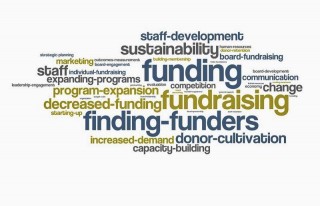Career Focus: Development
 America’s charitable community plays an indispensable role in improving communities across the country. Whether caring for victims of natural disasters, stimulating creativity in the arts and sciences, protecting free speech, or supporting the vulnerable and needy, nonprofit organizations are critically important to our nation’s wellbeing. And regardless of their mission, fundraising is their lifeblood.
America’s charitable community plays an indispensable role in improving communities across the country. Whether caring for victims of natural disasters, stimulating creativity in the arts and sciences, protecting free speech, or supporting the vulnerable and needy, nonprofit organizations are critically important to our nation’s wellbeing. And regardless of their mission, fundraising is their lifeblood.
The process of fundraising used to be fairly simple. A person with a cause asked a person of concern to share in responding to a human or social need. There were no formal procedures or guidelines, nor were there any controls or regulations. Today, the plaintive cry of harassed nonprofit executives straining to match inadequate income to expanding budget requirements is a frequent encounter of boards of directors, donors, and staff. Philanthropic fundraising has become a sophisticated profession, and the need for fundraisers has increased considerably. The liberty movement is no exception to that, as there are typically more job vacancies than qualified and experienced people to fill them.
While a policy expert typically focuses on just a few issues, fundraisers for policy groups have a responsibility to be informed and think critically about a variety of issues. In addition to being an advocate for their organization, they are the bridge that connects the resources and turns thinking into action. While it is not the primary focus of their responsibility, many fundraisers participate in policy debates and teach colleagues and donors about the issues.
In recent years, donors have increased their expectation from reading a copy of the publication they supported to receiving a report of its impact. This can be tough because it is very difficult, and sometimes impossible, to measure success in a universe of ideas.
Ironically, the most measurable success of an idea-focused organization is its ability to meet revenue goals. This success, of course, is dependent upon a successful fundraiser. So how does one raise money without commitments to significant tangible and measurable results?
There is a discipline to fundraising that progresses in logical order from preparation to planning to execution to control. This sequence is about as close to a science as one can get and can serve as an effective roadmap for fundraising. But even with perfect processes and controls, the bottom line is that the most critical component of the fundraising process is building relationships.
This is what makes fundraising so unique. While there are certainly techniques and tricks of the trade that fundraisers use, the most valuable skills that a fundraiser possesses are not learned in a college class. Successful fundraisers are passionate about their beliefs and have a true desire to correct a problem. And they have the ability to passionately convey that problem and its solution to someone who can invest the financial resources to make it happen.
This shared conviction between fundraiser and donor becomes the foundation from which they will build a long-lasting relationship that will be sustained through their mutual interests and desire to correct a problem. This knowledge is both powerful and enabling, and the insights that donors share with fundraisers create opportunities for stronger relationships. In turn, these relationships provide donors with the confidence to continue investing in the solution.
As it has been for a very long time, the frantic search continues for that dreamy fundraising ideal—an abundance of gifts to meet budget requirements with a minimum investment of time, talent, and energy. And despite lofty efforts to harness it, no magic formula has ever been devised to transform a fervent, even desperate, wish into instant results. But new technologies are enabling fundraisers to continuously rethink the ways in which they communicate with donors, and the sky is the limit.
Fundraising in the world of ideas is an exciting and meaningful career. No other position within a nonprofit organization offers the diversity, responsibility, and immediate satisfaction that successful fundraisers experience. Fundraisers in the liberty movement have the additional benefit of being actively engaged in protecting and advancing freedom and the pleasure of fostering and building relationships with those who can and do make a difference through their generosity.
This post, written by Lisa Hazlett, is an excerpt from the IHS “Creating Your Path to a Policy Career” guide. If you’re looking to build skills in development, apply to our spring 2016 fellowship.
